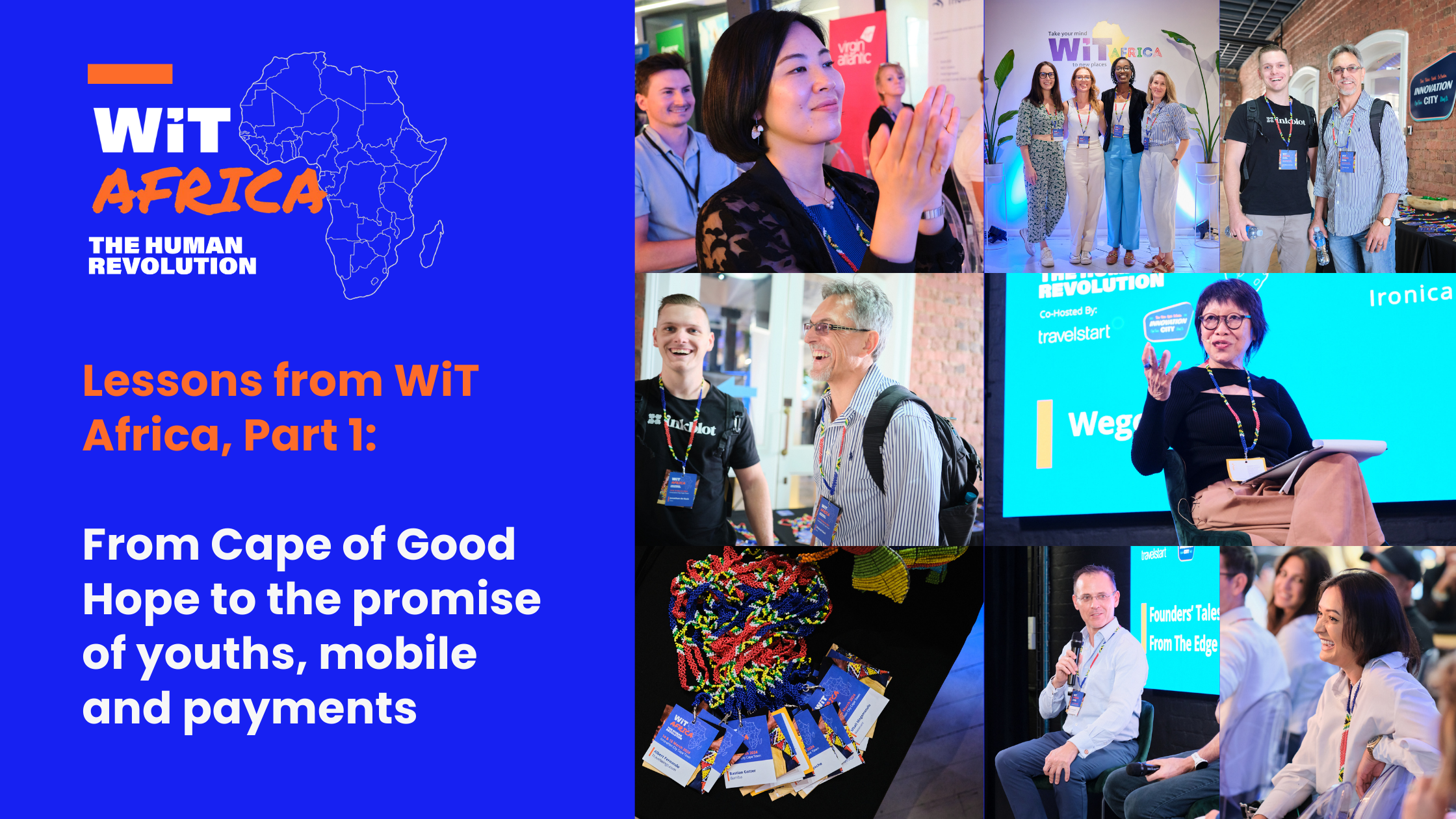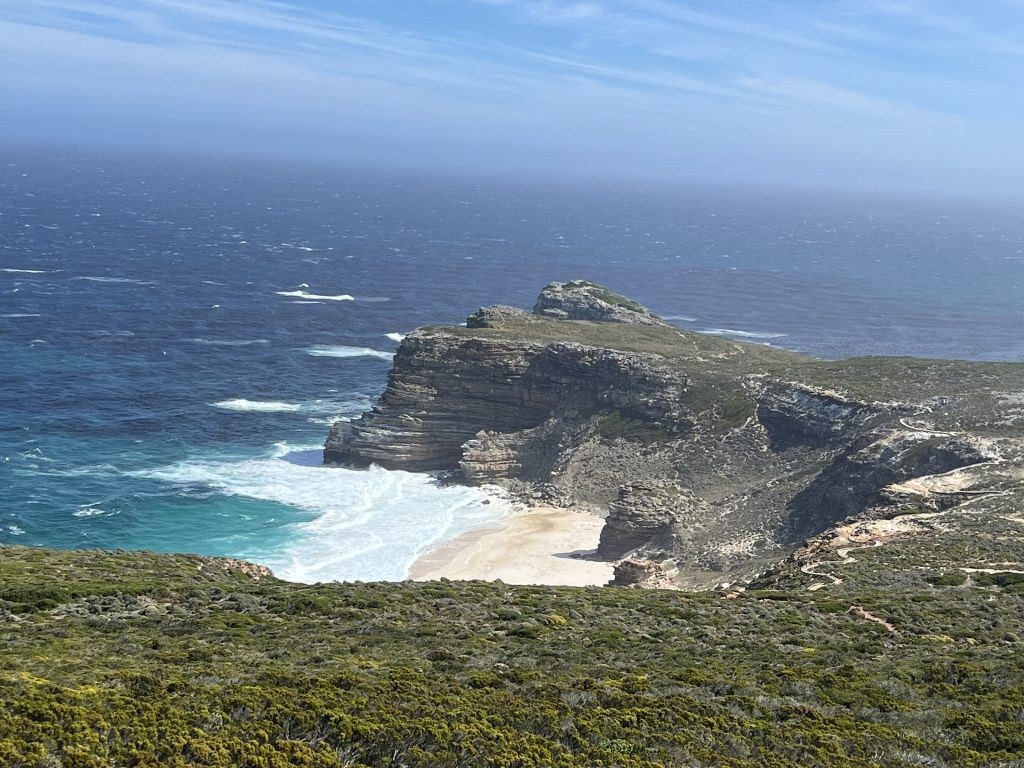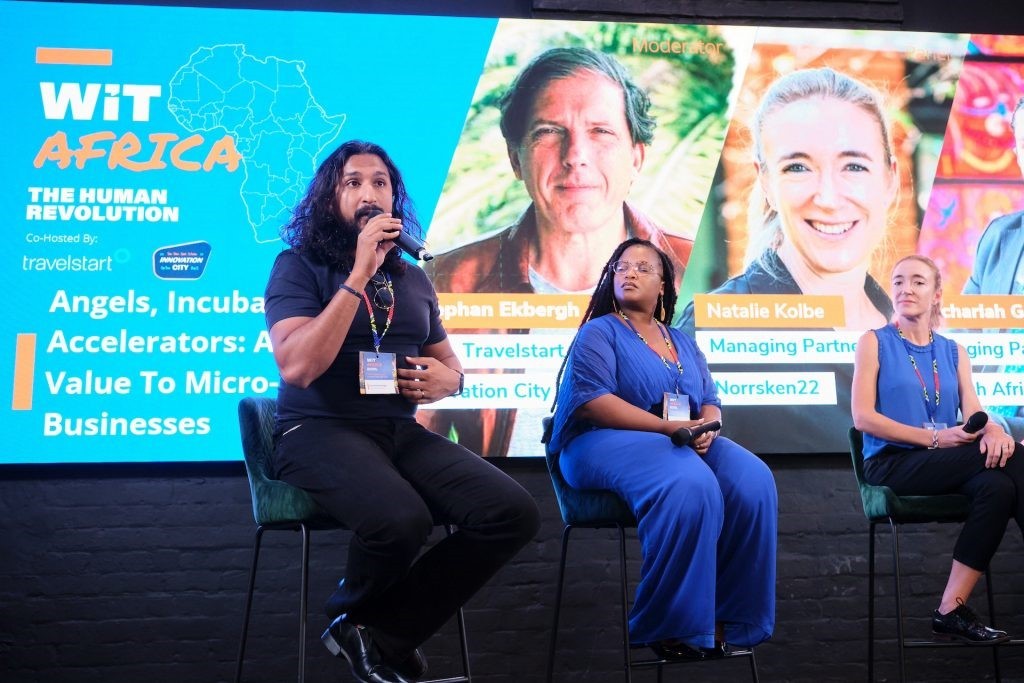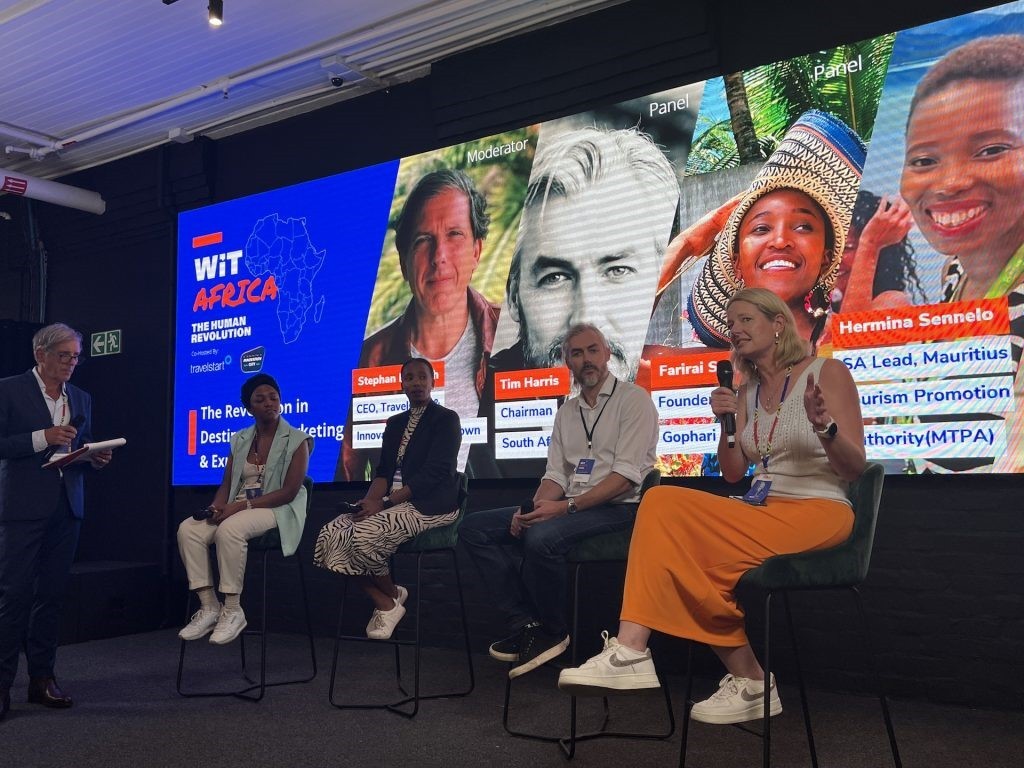
19 Mar Lessons from WiT Africa: From Cape of Good Hope to the promise of youths, mobile and payments
By Yeoh Siew Hoon
“NDC adoption is slower than two elephants making babies”, was among some of the more colourful quotes at the first WiT Africa!
“Isn’t it wonderful to wake up to views like these?” said Farai, our driver, taking the very words from my mouth as we weaved through the coastline from Llandudno to Cape Town airport, to catch our flight home to Singapore.
For the past seven days, I have woken up to these views and every evening, I have seen sunsets so beautiful they bring tears to your eyes. Yesterday, on Sunday, we did an epic road trip to the Cape of Good Hope and Cape Point, two places long been on my bucket list.

I remember standing, a few years ago, at the port of Belem in Portugal, at the point where the early Portuguese seafarers ventured forth on their voyages, and vowing to myself that I wanted to see the other end of their expedition, the Cape of Good Hope – the power indeed of a place and a name to evoke longing and romanticism in a wandering soul.
As I stood at the bay of the Cape of Good Hope, I imagined what it must have looked like when the first Portuguese explorers landed – I would imagine pretty much the same, but perhaps the rocks not as eroded as they have been over the centuries, by the strong and blustery winds at this point of the cape.
You can literally be blown away here and the waters where the two oceans, Indian and Atlantic, meet are treacherous, said to be the graveyard of at least 3,000 ships.

At Cape Point, you need to climb to the lighthouse at the top to get the best view of the meeting point of oceans. Tip: Don’t attempt selfies on the edge, a few have reportedly been blown off into the abyss. Social media just isn’t worth dying for.
But making it to Cape Point and soaking in the power of place, and what its geography has meant to the evolution of travel and humankind, is worth living for. So is visiting the cute and adorable African penguins at Boulders Visitors Centre, on the way here, and then the drive back to Cape Town through Chapman’s Peak, easily one of the most stunning coastal drives I have ever been on.
At every turn, wow moments of blue waters meeting white sand, fringed by cliffs and rocky outcrops, and in one bay, kite surfers having the time of their lives, with the strong windy conditions of the day. Seeing them fly literally through the sky to land in the water made me gasp and wonder, why would anyone ever work here when there’s so much beauty and nature to be enjoyed?
But of course, that’s through the eye of the traveller and underneath every beautiful façade are human stories of strife and struggle, and strive and success.
This is my take on the African travel story – Part 1 of my key takeaways from the first WiT Africa, held in partnership with Innovation City and Travelstart.

1. The Next Generation is here – VCs betting on Africa’s youth
Natalie Kolbe, managing partner of the pan-African venture capital firm, Norrsken22, said if one took a bird’s eye view of the continent, “the median age is 18, and so the next generation is here”.
Norrsken22, set up by a group of Swedish technology executives led by Niklas Adalberth, co-founder of the Stockholm-based ecommerce platform Klarna, closed a $205m fund this year and invests exclusively in growth-stage technology start-ups in Africa. The fund has made five investments, including challenger bank TymeBank, B2B commerce retail platform Sabi, identity verification solution Smile Identity, auto financing platform Autochek and financing app for informal merchant communities Shara.
Zachariah George, managing partner of Launch Africa, considered the most active investor in Africa’s tech startups, cited the key factors driving change – Africa has the fastest growing and youngest population in the world and there are more mobile phones today in Africa now than anywhere else in the world. “14 years ago there were more mobile phones in Manhattan than the whole continent, cost of data has dropped significantly, it’s a carbon copy almost of where India was 12 years ago.”
He said that Cape Town, Lagos, Nairobi and Cairo are the hot beds for innovation in Africa. With the high cost of acquiring customers, the vast majority of successful tech companies are B2B. “If you are in B2B, you can easily scale with payment providers, telcos such as MTN or banks and retailers,” said George. “Compare that to a Dutch fintech, trying to scale across Europe, where each country has its own fintech regulations. In Africa, if you play your cards right, you can scale more easily.”
Launch Africa Fund 1 has invested $31m so far in 133 companies across 22 markets. It is looking to close Fund 2 of $75m. Travel tech is clearly not top of mind for VCs yet – George said he had personally invested in two travel startups, one payment-related, a Buy Now, Pay Later, model, thinking it would be the right model for Africa, but “for some reason, it didn’t take off”.

2. Mobile’s leapfrog effect – the story of Paystack
Mobile’s leapfrog effect, just as it happened in South-east Asia, has helped the rise of payments startups such as Nigeria’s Paystack, one of Africa’s most successful startup stories, with its acquisition by Stripe in October 2020 for more than $200m. At the time of the acquisition, Stripe’s CEO Patrick Collison said, “There is an enormous opportunity. In absolute numbers, Africa may be smaller right now than other regions, but online commerce will grow about 30% every year. And even with wider global declines, online shoppers are growing twice as fast.”
Paystack’s CEO and founder Shola Akinlade told WiT Africa he started the journey of building Paystack in 2015 and before that, he didn’t sleep for 365 days, and hasn’t slept much since, he laughed.
After college, where he learnt to write software, he worked in Standard Chartered Bank and realised the headaches around payments. “You need to prove to banks that you deserve access to their APIs so in 2014, I spent one year working day and night, talking to people to try and figure out the problems and how to solve it,” said Shola, adding he was inspired by Stripe.
When it got noticed by Y-Combinator, “that’s when it became real in my head. I mean, we have 1b people, and it’s a big problem, so if you can solve that problem, you can unlock real value.”
Urging travel providers to work with Paystack, he said, “We want to make it easy for people to accept payments, there are so many different ways and channels but we have one channel that aggregates everything so you can focus on travel, what you do best. If you are building for Africa, key issues are inclusion and trust.
“We want to help solve tourism, we power all the domestic airlines and travel agents in Nigeria,” he said, adding “70% of transactions are refunded within seconds, not seven days.”
Christian Bombrun, group CEO, digital platforms for MTN, which covers 290m subscribers across 19 markets, said there were 489m unique mobile subscribers (43% penetration) in sub-Saharan Africa and 287m active data subscribers (25%). He said the mobile market represented a $170b opportunity for travel. “There is a large market to leverage.”

3. Payments, the next leapfrog phenomenon but first, the hurdles
The hottest sector in tech startups is fintech, said Launch Africa’s Zachariah George. “Why? Africa is extremely complex and telcos dominate. If you don’t solve for fintech, it’s almost impossible to solve for any other tech. As a founder you have to have an embedded financial solution in your offering no matter what vertical you work in.”
In travel, it’s a hard problem, with Jonathan Smit, CEO of Payfast, saying, “Payments in Africa is hard. Only 3% of commerce occurs online. Things won’t change dramatically any time soon.”
For it to change, Paulina Klotzbucher, CEO of Glyde Payments, said, “Banks need to make a leap into the new age. Blockchain tokenisation is the future. Multiple forms of payment, log into a website and it will check everything – credit, insurance, etc, the checkout, the payment will be instant and the travel agent only needs to pay the airline. Why are we not doing this immediately?”
Mbali Mngomezulu, manager, business development for Mastercard in South Africa, posed the question, “How can we have equitable access to credit? Credit is a major conversation for Africa as a whole. Is credit the solution for Africa? Young people are using “stokvels” to buy weaves, expensive booze, why wouldn’t that expand to travel?”
Perhaps she said a rethink was needed around how tourism boards were promoting their destinations. Visiting friends and family equates to 60% of African travel, she said, adding that a young Nigerian girl does not necessarily want to go on safari. “We need African solutions for African problems,” she said.

4. Air connectivity and visas – critical to unlocking Africa
Timothy O’Neil-Dunne, managing partner, T2Impact, addressed the elephant in the room when he said the biggest thing holding African travel back was the lack of flight connectivity. “That it is cheaper to fly from Lagos to London and then back to Accra than to fly nonstop (a 90 minute flight) is symbolic of the problem.
“Africa is not a continent that is connected. It is a series of islands. There are only a few airlines offering connectivity inside the continent,” he said.
Wego’s CEO and co-founder, Ross Veitch, said, “Africa desperately needs open skies and uniform approaches to taxation. This will open borders and it will benefit every country, and be great for the economies.”
He said governments should not look at visas as revenue-generating but embrace the idea that visa liberalisation leads to economic growth.
Travelstart’s John Friel said, “Government control and theft are the reason why only two percent of Africans travel via air. The reason is simple – high cost. We just need to make sh.. easier in Africa – visas are an illness in almost every country.”
5. Digital connectivity at early days, NDC slower than “two elephants making babies”, tours and activities “lots of little ants”
Then there’s the kind of connectivity that facilitates travel e-commerce and there are many players working away at it – from flights, to accommodation, tours and activities and transportation.
In airline distribution, Travelstart’s John Friel said adoption of NDC in Africa has taken longer than “two elephants making babies”. “It’s been super hard to get it off the ground. Africa is behind, South Africa is not. Travelstart is South Africa’s number 1 NDC supporter for Singapore Airlines, Kenya Airways, British Airways and Emirates.”
In terms of sales between October 1 and March 17, Friel said Travelstart’s penetration for these airlines respectively were 96%, 83%, 75% and 63% – “top class penetration”, he said.
As in other parts of the world, the pandemic has caused an acceleration in digitisation among hotels, both branded and independent, as well as in tours and activities. Theresa Emerick, managing director of Nightsbridge, said her business of digitising independent hotels and lodging has seen robust growth with tech such as contactless and revenue management tools.
However it’s been tougher going for her in the tours and activities business. “If you asked me what I should have said no to, it would have been to entering tours and activities,” she told WiT. “It’s a completely different tech stack and it’s super fragmented.”
Pierre Kleinhains, founder and CEO of Activatar, the South Africa-based tours and activities platform, acknowledged the challenges of the market. “Africa has a low density of activity providers and a lot of the activity operators are very small and non technical or are owned by lodges who do not serve day visitors.”
He said the company grew by 43% last year and is “looking forward to doing better this year. We are tweaking some aspects of our business model to further diminish the price perception influence of low price African systems”.
He said, “The African activities market is still very DMC driven with many companies relying on that channel as their main source of revenue. Many big turnover companies do only a small part of turnover via e-commerce, because e-commerce is neglected by them. Fortunately the change has started here. Among Activitar customers, The Franschhoek Wine Tram, Untouched Adventures and Ceres Rail Company are the biggest online sellers. But the biggest activity providers are the Lion and Safari Park, Mankwe Gametrackers and The Featherbed Company.”
Sharing lessons from Asia, Chan Chee Chong, CEO of GlobalTix, Singapore, said with more tours and activities operators in Asia adopting reservation technology, it’s made them more discoverable and instantly bookable on OTAs, and hence OTA share has risen in the experiences sector. Other trends he cited included banks and affiliate partners coming into travel; niche possibilities; and the rise of secondary destinations, hence creating the need for transportation.
Both Chan and Kleinhans believes that even as “giants (elephants) enter the market, there’s still room for lots of little ants”.
Chan said he’s exploring Africa as a new market but is aware of the challenges. “But one key takeaway for me is the young population – average age 18 years – that’s exciting. A new generation with different value and aspirations.”

6. Nigeria – local solutions to local problems, conversational commerce over AI
For Bayo Adedeji, CEO of Wakanow, the leading hybrid OTA in Nigeria – it has 65 physical travel stores, with plans to increase to 110 – it’s about finding local solutions to local problems.
“Africa is built on relationships. They want to see the guy they’re paying. There’s a trust issue. You can’t model a business on the Western model. Four percent of our customers pay with card, so I must adapt my business to provide the customer’s payment options.”
For him, new tech such as AI does not have much practical application at the moment, rather conversational commerce is more important. About 25% of its transactions happen on WhatsApp.
He called “Buy Now Pay Later” a Western concept. For Wakanow, it’s Pay Small Small (PSS), “a flexible travel payment plan that allows customers to lock down great travel deals by making as little as 25% down payment of the total travel cost and paying the rest in convenient instalments”.
Then there’s the whole issue of “addressable market”; yes, the big picture numbers are huge but how much of it is addressable for travel companies.
Wego’s Veitch, whose company is making inroads into Northern Africa from its Middle East base, said it was hard to get data on the African market but he proposed the theory that when markets reached a US$10,000 median income level, that means they reach propensity to travel which means a market of about 50m in Africa, out of a population of 1.2 billion.
To which Bayo said, “Way, way less than that.”
Bukky Akomolafe, country manager of Travelstart Nigeria, said it was probably only 1% of Nigerians who could afford to travel. “These are the super rich and we are all fighting over that pie.”
To expand the size of his addressable market, Bayo looks at the idea that “all mobility is travel”. “How do we get more people to travel? Instead of just flights, we can sell them rail, bus, etc.”
Agility is also critical – he sees destination diversification as a great opportunity for players in Africa. “Keep looking for new destinations, those that don’t have visa limitations,” he said. For example, when travel to Dubai became a problem due to visas, Wakanow switched to selling Rwanda, which had liberalised visas, “and that business made up for the Dubai hole”.
7. Global players making inroads in inbound, last minute trend accelerating
Global players are seeing strong recovery levels for inbound travel into Africa. Calling Africa one of the fastest growing regions, Carlo Olejniczak, vice president and managing director of Europe, Middle East and Africa (EMEA), Booking.com, said in 2022, “we grew by 13% and in 2023 a record-breaking 17%”.
It is seeing growth in transactions of its “connected trip”– meaning two or more travel components within a trip – globally, including in Africa.
He sees three big opportunities for Booking in Africa – more “connected trips”, ease of payments and better connectivity.
Accor, whose pipeline in Africa will grow to about 170 hotels in Africa, has seen 104% levels of recovery in business, according to Mark Flower, Vice President Commercial Market Strategy, Middle East, Africa & Turkey, Premium, Midscale & Economy.
Digital connectivity is key to accelerating this growth, said Flower, adding it’s been holding “Heartist” digital workshops to train its general managers and teams on digital marketing skills and pivoting its sales organisation to reflect the changing mix of business – from B2B channels to more B2C digital marketing.
Accor announced record results in 2023, including over 20% revenue growth and over €1 billion in EBITDA, a historical milestone. Its digital performance shared by chief digital officer, Alix Boulnois, speaks to this shift towards online – + 42% in new members joining ALL – Accor Live Limitless, +29% in revenues from websites, +47% in revenues from app and +26% in revenues from distributed channels.
Flower said this shift was pretty evident in Africa as well but one standout is the last minute bookings. Before Covid, he estimated, last minute bookings would perhaps be five to eight percent of bookings but now hover around 15-18%.
“We can have a hotel that’s 60% at 6pm and then by 9pm, it’s 90%,” he said. “Customers who are booking on the spot as well – we saw that trend in China, and it’s happening here.”
Flower said Accor was using AI for retargeting, forecasting and food waste management. “AI takes the emotion out of forecasting,” he said.
8. No lack of emotion and passion in building Africa travel
One thing’s for certain – there was no lack of emotion and passion expressed in all the conversations on stage.
In all the WiTs we’ve held all over the world, I’ve never come across a bunch of speakers who speak their minds, with brutal honesty and disarming humour, and with a blend of realism-romanticism-idealism that speaks to their genuine love for their land and fighting spirit to make lives better for everyone through travel.
During the destination marketing panel, Stephan Ekbergh, CEO of Travelstart, asked his panellists, “what is travel to you?”
Tim Harris, outgoing chairman, South African Tourism, said, “Jobs.” Farirai Sanyika, Founder & Director, Gophari, cited, “Freedom”. Hermina Sennelo, SA Lead, Mauritius Tourism Promotion Authority, picked “passion”. Linda Balme, commercial manager, Travelstart’s choice was “purpose”.
Sums it all up.










